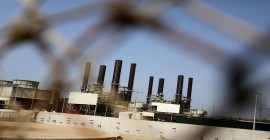Implications of the Ban on Gold Imports and Exports from and into Gaza
Hansaa Rantisy – Palestine Economy Portal
Translated by Tamara Barakat
Mahmoud Atweh, chair of the Gold Traders Union in the Gaza Strip, warned about the consequences of Israel’s unjust decision for the Gaza Strip’s market. More than 300 employees lost their jobs and became unemployed as a result of this decision.
There are 45 gold factories in Gaza, of which 35 are not operating. Around 7-10 factories are struggling to operate under the difficult conditions resulting from the siege on the Gaza Strip and the ban on imports and exports.
The decision to ban imports and exports of gold from and into the Gaza Strip for the past 8 years prevented many of gold workshop owners from resuming their work, and the renewal of the ban will add to the frustrations of any of those who wanted to return to their work.
Moreover, Atweh said that after the decision of the ban was announced, the price of a carat of gold decreased by 1.5 JD, and is expected to further decrease by 2 -2.5 JD/carat. Gold prices are correlated with the international stock market, but as the selling price of gold decreases in comparison with international prices, this will cause stagnation in the gold industry in Gaza.
Atweh called on the specialized parties and the Government to interfere immediately and place pressure on Israel to revoke its decision.
Yaqoob Shahin, general manager of the Precious Metals Department at the Ministry of National Economy, said that communications with gold traders in the Gaza Strip were made to arrange the export of gold, after they were permitted on Sunday and Wednesday to export 2 kilograms of gold to each merchant in the West Bank. However, after the Israeli decision was announced the Ministry was unable to continue controlling the import and export of gold into and from Gaza.
Commenting on Atweh’s request of the Government to pressure Israel to lift the ban, Shahin said, “We are letting the Civil Affairs and the Borders and Crossings Commission negotiate with the Israeli side, since our role as the Precious Metals Department at the Ministry is to organize the entry of the gold, inspect it to make sure it meets the standards, and inspect its hallmarks.”
Regarding the overall prices of gold and whether they are correlated with the international stock market, Shahin explained, “Gold is imported into Palestine as a good and not as money. Certain amounts of it are imported illegally. Last year, around 10 tons of gold were imported in the form of alloys, but after having caught a Jordanian vehicle at the Allenby Bridge attempting to smuggle gold, such smuggling operations decreased.”
“Raw gold prices in Palestine increased by 60-70 dollars per ounce in comparison with international prices. There are some concerns on whether factories would be able to provide gold for industrial use, which will ultimately negatively impact citizens,” he continued.





